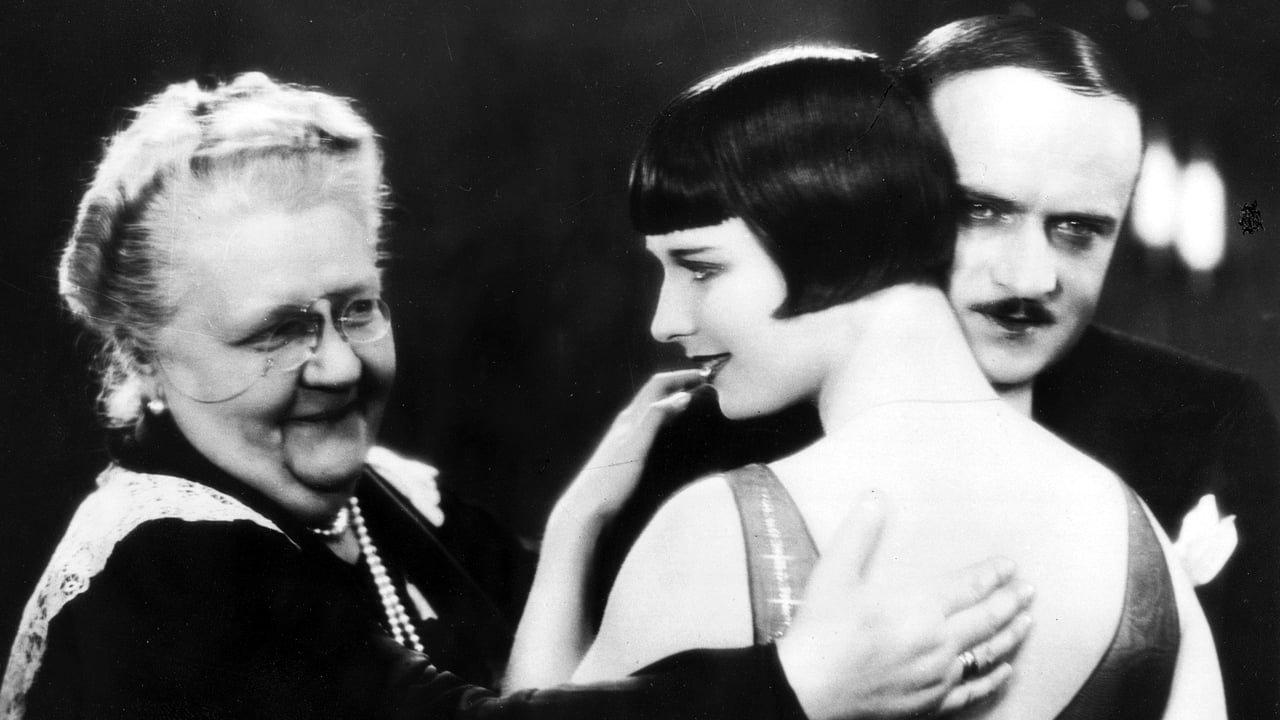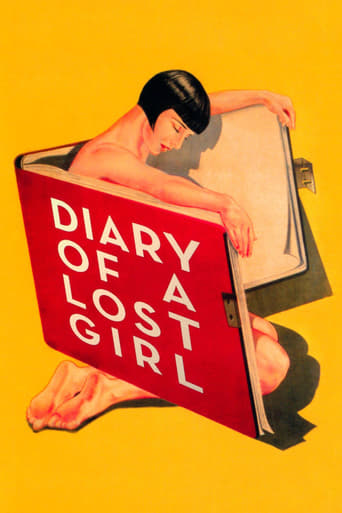Phonearl
Good start, but then it gets ruined
Bessie Smyth
Great story, amazing characters, superb action, enthralling cinematography. Yes, this is something I am glad I spent money on.
Darin
One of the film's great tricks is that, for a time, you think it will go down a rabbit hole of unrealistic glorification.
Staci Frederick
Blistering performances.
tomgillespie2002
It isn't difficult to see why Georg Wilhelm Pabst's Diary of a Lost Girl caused a bit of a headache for the censors back in 1929. Even for a movie made during the Weimar Republic era, a revolutionary time for cinema when directors were consistently pushing the boundaries with controversial tales of debauchery and Germany's seedy underbelly, the themes and social insight feel unnervingly modern. Teaming up once again with his muse Louise Brooks, the Kansas-born starlet plays Thymian, the naive daughter of a wealthy pharmacist who, in the opening scene, watches their maid leave the family home in shame when Thymian's father (Josef Rovensky) gets her pregnant.Although it's clear to the audience, Thymian is puzzled as to why the girl has left. Her father's assistant, the creepy and much older Meinert (Fritz Rasp), invites her to the pharmacy that night on the promise to tell her everything, but instead takes advantage of the young girl and gets her pregnant. When the baby arrives, Thymian refuses to reveal who the father is but her family learn the truth from her diary, and insist that the two marry to avoid damage to the family's reputation. When she refuses, Thymian's baby is taken from her and she is packed off to a reformatory watched over by the intimidating director (Andrews Engelmann) and his tyrannical wife (Valeska Gert). After rebelling against the school, Thymian and a friend escape and join a brothel,Like many films made during the Weimar era, Diary of a Lost Girl depicts the decay in almost every aspect of German society at the time. The lives of the rich are stripped bare, and their motivations are heavily questioned when the family send Thymian away not with her 'rehabilitation' in mind, but simply to save face. The reformatory itself is a cold and bleak place, where the director's wife bangs a rhythm for the inhabitants to rigidly eat their soup too. They are less concerned with helping the girls fit back into the society that has failed them, and more about satisfying their own sadistic desires. In one particularly effective close-up, the wife seems to be achieving some sort of sexual gratification from her monstrous behaviour.The one place Thymian feels accepted on any sort of level is the brothel, a place where she can be herself without any kind of judgement or fear of social exile. While Thymian can at times be frustratingly naive and swoonish whenever she finds herself in the arms of a man, Louise Brooks delivers a tour de force performance that helps the audience maintain sympathy for her put-upon character, even when the film is at its most melodramatic. Even though the film is now 87 years old, Brooks's acting feels completely modern. Where most silent actors switch between rigid and operatic in their performances, Brooks is naturalistic and subtle, making it clear just why Pabst was so eager to work with her again after Pandora's Box, made the same year.
mishaa7
"Diary of a lost girl" - the second film adaptation of the novel, supposedly based on a true story, the writer of the last century, Margaret Bome. Received by the press in 1905, is the most famous and best-selling book of women. By the end of the twentieth of its sales has exceeded more than a million copies, making the novel one of the top bestsellers of its time. One modern scholar has called "Diary of the Fallen" "Perhaps the most notorious and, of course, commercially the most successful autobiographical story of the early twentieth century.Literary sensation. According to the author tells the true story of a young woman forced into prostitution circumstances. At the time of publication, believed to be an authentic book is a diary, but argued only Bome that was its editor. Likewise there has been the emergence of the myth of some novel effects on social reform at the time.The first screening took place in 1918, director Richard Oswald «Das Tagebuch Einer Verlorenen». To date, the film is considered "lost" and no one in the audience has no opportunity to see it.The second film adaptation was the work of the so-called "historic duet" Georg Wilhelm Pabst filmmaker and an American actress Louise Brooks. According to rumors, he asked her did not even know, seeing only her picture with a charming and powerful features, a mysterious look. That same year she appeared before him in a few ambiguous psychological drama "Pandora's Box." Both films are emblematic of the German cinema of the late twenties and this despite the fact that the young Brooks at home in the states acted in film punchings, second-rate bands, however, after the Commonwealth with Pabst has signed a lucrative contract with film company «Paramount».Their duet was a success for both of them. Brooks joined the amazing image of her heroine, expressing regret and despair with a rare subtlety of nature, while Pabst reel filled with memorable, vibrant and accentuate the culmination of events moments, particularly a scene in a brothel, where circling in the dance of prostitutes and their clients share a daughter and a fallen selfish father in a sudden encounter. The story itself, as the film is filled with meaningful scenes. In the episode where the assistant girl's father clings to Meyner Thyme, after which the heroine of Louise Brooks, faints and he was a "dirty" smile carries her into his bedroom, symbolizes the suppression of pure kindness naive girl in front of vicious evil bastard lust. Georg Wilhelm Pabst film can also be partly compared with the early work of director Charles Chaplin. One of the scenes of the film in the penitentiary, which enters the main character, is very ironic and ambiguous context. Girls taking place in this institution re-education, and in fact every day tolerate violent attitude on the part of both the moral and ugly teachers, arrange one evening in a dormitory rebellion, lashing out at their supervisors throughout the crowd with his fists. Similar scenes are in movies of Chaplin, it is in his films where he played the director, when he kicked his foot heroes stupid and evil members of the order, thus showing their relationship to government authorities at the time as a whole, whose policies have complicated the lives of many people."Diary of the Fallen" - a psychological drama with realistic events, which is a blow to the selfish bourgeois society in the face of vicious character depicted in the film. The story of the preservation of resilience, kindness, courage, compassion, and love the girl, despite all the troubles through which she had to go through.
mukava991
Twice in DIARY OF A LOST GIRL naive young Thymian (Louise Brooks) is raped after passing out - that is, stone cold unconscious for a lonnnngggg time - while being held in the arms of a man (first while conversing and second on the dance floor after drinking one glass of beer). This is too much! Was it perhaps considered normal in those days for sweet young things to faint dead away while in men's arms? I doubt it - even in D.W. Griffith films. Brooks, a stunner if there ever there was one, looks as if she could chew up these men and spit them out, which she sort of does by the finale. Fritz Rasp, as the first rapist, plays a character similar to his White Russian agent in Pabst's THE LOVE OF JEANNE NEY (1927) - a man so repellent that no decent person would want to spend one minute in his presence. German cabaret artist Valeska Gert is memorable as the sadistic headmistress of the kind of reform school we would expect to encounter in "Our Gang" comedies, Oliver Twist dramatizations or Max Fleischer cartoons (the children are forced to lift spoonfuls of gruel to their mouths in time to a beating drum). The camera devours Gert's bald, brutish husband (Andrews Engelmann) at length as he curls his lips into a sickly smile, to make absolutely sure we see what an evil reptile he is. For a film about a "diary," one wishes that the screen time devoted to the heroine's actually writing in it were one tenth as long as villains' closeups.
Igenlode Wordsmith
I was assured that "Diary of a Lost Girl" was more accessible than "Pandora's Box"; it is. This is much more a straightforward human narrative than an attempt at representing archetype, and there is also less presumption that we are already familiar with the subject matter: it does not require so much intense concentration just to keep up. In addition, there are a greater number of sympathetic characters -- which is to say that there are some! However, the notorious Louise Brooks still did not come across to me as being a good actress. In fact, if anything I felt that her performance here was more stilted than in "Pandora's Box", where from time to time I was actually impressed. She is far too obviously sophisticated for the early scenes of a teenage Thymian -- Brooks is no Mary Pickford -- and although she is more convincing as a workhouse rebel, I found myself frequently feeling that the actress was simply a beat behind the action; standing there waiting for an off-screen voice to tell her how to move or react, rather than inhabiting the character within the world of the film. Contemporary critics called her acting for Pabst "wooden", and to this viewer all too often she comes across as a beautiful waxen doll, expressing at best one emotion per scene -- these pictures do not represent her best work.Nonetheless as a whole the film held my interest and was entertaining. (It was frightfully convenient the way that Thymian would faint whenever she was on the point of sexual congress, however... thus enabling her to be presented as the most innocent of 'fallen women'!) Perhaps the most effective are the rigidly synchronised and choreographed scenes in the workhouse -- to an English audience inevitably reminiscent of "Oliver Twist" -- followed by the girls' final rebellion, which was the first point at which the picture really began to engage me emotionally. (I was somewhat disappointed to discover at the end of the film that the rebellion had apparently had no long-lasting effect; even the same superintendent was still in charge.) I actually cared about what happened to Thymian and her circle, which made a pleasant change.That final title, though..! I can only assume it's not quite so thumpingly preachy and obvious in the original German; it completely broke up the mood of the scene for me, and thus detracted from the whole end of the film. Someone clearly didn't have faith in the actors' presentation, and felt the need to drive the moral home with a sledge-hammer.

